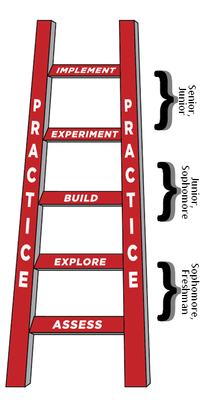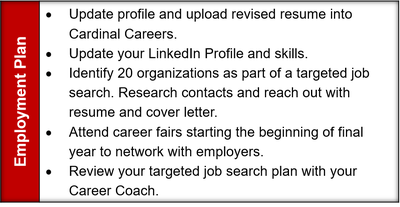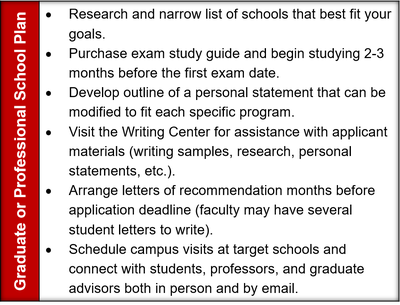Career Success Plan

Sound career choices require information - information about you and about various occupations. Whether you are deciding on a major or preparing for your job search, there are steps in the career development process which will support your efforts. The staff in the University Career Center (UCC) will assist you in your journey - one which is unique to every individual.
In support of its mission to educate students through the exploration of career interests, values, and skills and its vision of engaging the campus community in comprehensive career and professional development, the UCC offers the Career Success Plan to guide you:
Assess- your values, interests, personality, and skills (VIPS)
The first step in your journey is identifying and understanding your values, interests, personality, and skills (VIPS). Talking with your Career Coach and taking a career assessment can help you find out about yourself and aid in developing a career plan. Your academic advisor can help you declare a major and develop your academic plan.
- Use Focus 2 online career assessment to identify your VIPS and related occupations.
- Get involved on campus and in the community. This is a great way to clarify your VIPS. The Office of Student Involvement and the Engage platform is a great place to start!
- Consider taking career courses such as GEN 201—Major Exploration and Career Decision-Making or ECPY 301—Personal and Academic Inquiry.
- Meet with your Career Coach to begin choosing a career cluster and pathway.
Explore - your career options and academic majors
The next step is to relate your self-assessment (VIPS) to different majors and career fields. Researching and exploring different fields are important for learning how occupations are organized by similar values, interests, personality, and skills (VIPS). The UCC uses the 16 Career Cluster Model to illustrate how occupations are organized. Other topics to consider are nature of the work activities, education/training, work environment, career ladder, salary and benefits, and employment trends. It is important to investigate the variety of majors and the many careers to which they can lead.
- Look up majors and occupations in the 16 Career Cluster Model, Focus 2, and What Can I Do With This Major all listed on the UCC website.
- Explore hundreds of different careers using our Candid Career videos.
- Review other resources and websites on the UCC's webpage such as O*NET, Occupational Outlook Handbook, and Kentucky Center for Statistics.
- Contact alumni or employers to schedule informational interviews and/or job shadowing.
- Continue to meet with your Academic Advisor and Career Coach.
Build - your job-search skills
After you have declared your major, explored different career fields, and selected a field, it is time to develop job search skills so you can successfully communicate your skills and abilities to employers for internship and employment opportunities. Knowing yourself through self-assessment and identifying what is important to potential employers through career exploration will enhance your job search abilities. Whether you are applying for internships, or full-time career positions, you will first need to learn to develop effective resumes, cover letters, and interviewing competencies.
- Consult the UCC’s Resume Writing Guide, Cover Letter Guide, and other online resources available.
- Have your job/internship search documents critiqued through the Document Drop Program.
- Practice your interviewing skills in Big Interview, the UCC’s web-based practice interview program.
- Review the 10 Essential Skills sought by employers and incorporate into job search materials.
- If pursuing international internships or jobs, review information on your destination country in GoinGlobal.
- Create your LinkedIn profile including an appropriate headshot and then join professional groups for networking.
- Make sure Cardinal Careers profile is up-to-date and resume is uploaded.
Experiment - by gaining career-related experience
Once you have developed your job search skills, you can get practical information and experience through a variety of programs. To be competitive in today’s job market, the UCC recommends two internships before graduation. Other ways to gain experience include participating in experiential learning, service learning, student employment, undergraduate research, or study abroad programs. You may also consider conducting informational interviews, job-shadowing, or volunteering to gain greater insight into a particular field. It is important that you “test” your skills and abilities, gain related experience, and start building your professional network.
- Search Cardinal Careers and GoinGlobal for internship opportunities related to your career goals.
- Check with your academic department for guidelines on internships for academic credit.
- Visit the Office of Student Involvement for information on volunteer and service opportunities.
- Participate in engaged learning activities through the Center for Engaged Learning.
- Attend career fairs listed in Cardinal Careers.
- Meet with your Career Coach to review your plan for gaining experience.
Implement - your plan by securing a career-related opportunity or attending graduate or professional school
As you finish each internship or experiential learning opportunity, update your resume to reflect the skills and abilities gained. This can be done through our Document Drop Program, or meeting with your Career Coach to answer any remaining questions and review your career plan. If you are going to graduate or professional school, you will want to meet with faculty in your department. Both the job search and graduate school admission processes take time to implement.
- Research the Cost of Living Index in your target geographic area.
- Join the UofL Alumni Association and attend networking events.
- Join professional organizations related to your field.


Practice - life-long career management
Congratulations on your graduation! You are now ready to launch your career. Your first job out of college is the first of many jobs you will have after graduation. In an ongoing longitudinal study by the Bureau of Labor Statistics, workers held an average of 12.7 jobs from ages 18 to 56, with nearly half of these jobs held before age 24. The skills you develop early on will lay the foundation for future career success. We will help you learn the Career Development process you will use throughout your professional career.

